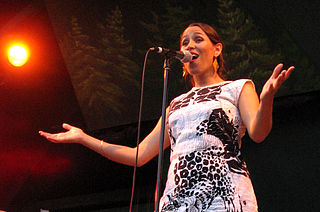A Quote by Billy Collins
I know my voice has a limited range of motion; I don't write dramatic monologues and pretend to be other people. But so far, my voice is broad enough to accommodate most of what I want to put into my poetry. I like my persona; I often wish I were him and not me.
Related Quotes
The expectation is this low, gravelly voice for John, but I went through his early recordings and there were songs in there where the voice was so different, I wasn't even sure if it was him singing, ... So it was interesting to me that we would see him develop the Man in Black sound. I thought it was really important that his voice change as his persona slowly solidified. The music was really the doorway into the character.
Do you have any idea how much I love you?” he asked. ”Enough to accept my apologies?” I suggested in a small voice. ”Heck no,” he said, and pushed off from the wall, stalking forward. When he reached me, he put his hands up and touched the sides of my neck with the tips of his fingers – as if I were something fragile. ”No apologies from you,” he told me, his voice soft enough to melt my knees and most of my other parts.
Until I am free to write bilingually and to switch codes without having always to translate, while I still have to speak English or Spanish when I would rather speak Spanglish, and as long as I have to accommodate the English speakers rather than having them accommodate me, my tongue will be illegitimate. I will no longer be made to feel ashamed of existing. I will have my voice: Indian, Spanish, white. I will have my serpent's tongue - my woman's voice, my sexual voice, my poet's voice. I will overcome the tradition of silence.
So much of what I love about poetry lies in the vast possibilities of voice, the spectacular range of idiosyncratic flavors that can be embedded in a particular human voice reporting from the field. One beautiful axis of voice is the one that runs between vulnerability and detachment, between 'It hurts to be alive' and 'I can see a million miles from here.' A good poetic voice can do both at once.
Write like you write, like you can't help but write, and your voice will become yours and yours alone. It'll take time but it'll happen as long as you let it. Own your voice, for your voice is your own. Once you know where your voice lives, you no longer have to worry so much about being derivative.
What has praise and fame to do with poetry? Was not writing poetry a secret transaction, a voice answering a voice? So that all this chatter and praise, and blame and meeting people who admired one and meeting people who did not admire one was as ill suited as could be to the thing itself- a voice answering a voice.
A lot of people mistake the persona that I create in poetry and fiction with me. A lot of people claim to know me who don't really know me. They know the work, or they know the persona in the work, and they confuse that with me, the writer. They don't realize that the persona is also a creation and a fabrication, a composite of my friends and myself all pasted together.
Can we move this along?" a bored voice stated. "I have places to be and people to shag." "Ian, I'm not going to hug you," I stated as I approached him. "I know you like this better." With that, I slapped him hard enough to rock his head to the side. When he'd straightened, he flashed me a wicked grin. "Finally, you give me what I want. Knew you loved me, Reaper.
There are no words and there is no singing, but the music has a voice. It is an old voice and a deep voice, like the stump of a sweet cigar or a shoe with a hole. It is a voice that has lived and lives, with sorrow and shame, ecstasy and bliss, joy and pain, redemption and damnation. It is a voice with love and without love. I like the voice, and though I can't talk to it, I like the way it talks to me. It says it is all the same, Young Man. Take it and let it be.







































